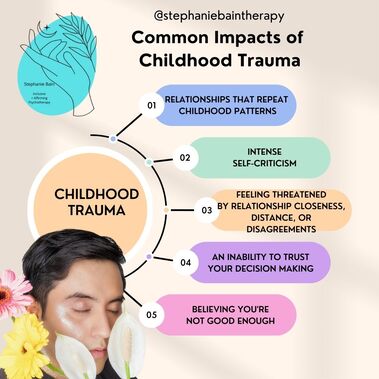|
I find myself describing some of the less common impact of trauma to my clients as a trauma therapist in Oakland, CA. Childhood trauma can result from a wide range of experiences, including but not limited to: 🌟Physical abuse 🌟Sexual abuse 🌟Emotional abuse 🌟Neglect 🌟Chronic Invalidation 🌟Witnessing violence 🌟Natural disasters 🌟Bullying 🌟Serious accidents, injury, health crisis 🌟Loss of, or fear of loss of, a loved one (death or separation) 🌟Poverty and severe lack of resources 🌟Fear of violence 🌟Racism, sexism, homophobia, transphobia, classism Childhood, developmental, or complex trauma can leave individuals suffering beyond the typical PTSD symptoms. The effects of childhood trauma can be long-lasting and can interfere with the development of healthy relationships, self-worth, and coping skills. I find myself describing some of the less common impact of trauma to my clients as a trauma therapist in Oakland, CA. If you have experienced ongoing childhood abuse, neglect, or even consistent emotional unattunement, you might identify with C-PSTD or Complex Trauma. Read more about Complex Trauma here. Childhood trauma can result from a wide range of experiences, including but not limited to:
Due to a lack of healthy relationship models and low self-worth, trauma may impact an individual's ability to trust others and form healthy relationships, leading them to find themselves in and tolerate abusive partners. Childhood trauma can also lead to feelings of worthlessness and self-blame, causing a person to believe they deserve abusive treatment. Trauma may lead to the repetition of unconscious patterns of behavior and emotions from childhood in present relationships. These patterns can manifest as conflicts, heightened anger, power struggles, or communication issues in the current relationship and often serve as a reenactment of childhood traumas, unmet needs, and unresolved conflicts. Trauma + Self-CriticismSelf-criticism can result from internalizing negative messages and beliefs individuals receive during traumatic experiences. These experiences can lead to feelings of shame, guilt, and self-blame, causing the person to believe that they are responsible for their own mistreatment. The intense self-criticism can also stem from a belief that they could have done something to prevent the trauma, or that they are inherently flawed or deserving of abuse. This self-criticism can have a profound impact on a person's self-worth and can lead to negative thought patterns and behaviors that perpetuate the cycle of trauma.
Trauma can lead to feelings of insecurity and fear, causing an individual to perceive even minor conflicts or perceived rejections as threats to their well-being. This heightened sense of threat can cause them to react with defensively, which can further strain the relationship. Additionally, trauma can also impact a person's ability to form secure attachment bonds, making it difficult for them to trust others and leading to a persistent fear of abandonment. Trauma can have a profound impact on an individual's emotional regulation system, altering the way the brain processes emotions, and causing a person to experience intense and prolonged emotional reactions, even in response to triggers that may seem minor to others. Trauma + Sense of SelfTrauma impacts one's sense of self and perception of the world. Childhood trauma can lead to feelings of self-doubt and a tendency to second-guess one's own thoughts and feelings and can also interfere with the development of healthy coping skills and increase anxiety, making it difficult for an individual to accurately interpret their internal experiences. Trauma impacts the brain's ability to process and store information, causing an individual to have difficulty discerning and trusting their own thoughts and feelings. Trauma can lead to feelings of self-doubt and low self-worth, causing an individual to question their own judgment and abilities. Trauma + People PleasingTrauma often leads to feelings of shame, guilt, and self-blame which can cause a person to view themselves as inherently flawed or inadequate. The lack of healthy self-worth and self-esteem leads to a persistent sense of insecurity and self-doubt. The belief that one is not good enough can have a profound impact on an individual's relationships, career, and overall quality of life. Trauma can lead to feelings of insecurity and fear, causing an individual to believe that their survival and well-being depend on the approval and acceptance of others interfering with the development of healthy boundaries and a sense of self, leading to difficulties in asserting oneself and saying "no" to others. This can cause an individual to be overly accommodating and to avoid expressing their own opinions or needs and living authentically. Looking from a trauma therapist in Oakland, CA? Learn more here. Looking for a queer couples therapist in Oakland, CA? Learn more here. Yes, straight couples welcome, too! childhood trauma + complex trauma
0 Comments
Leave a Reply. |
AuthorStephanie Bain, LMFT Archives
April 2024
Categories
All
***Resources are not a substitute for therapy and are not intended for making diagnoses or providing treatment. Not all practices and tools are suitable for every person. Please discuss exercises, practices, and tools with your individual therapist or health care provider.
|


 RSS Feed
RSS Feed